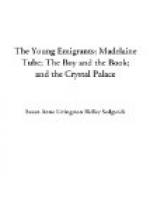Soon after the departure of Master Teuzer, the landlord arrived: he spoke roughly to the poor woman. “How is this? How dare you send that potter to me? Did I force you to take this room? If it does not suit you, why do you not leave it? The stove has lasted for thirty years, and I certainly shall not buy a new one for you.”
On hearing these invectives, Raphael had hidden behind his mother’s bed. Madelaine trembled, and dare not pronounce a word. But Madame Tube, extending her hands and trying to rise, cried, “Oh! Mr. Duller, I am quite innocent; I never thought of complaining of my room; I know but too well that poor people cannot expect to lodge like princes. Master Tenzer has been used to better stoves, but I am contented if the tiles do not fall upon our heads.”
These words softened the landlord a little. “If it is so,” said he, “I shall know how to treat this Master Tenzer if he comes again to meddle with things which do not concern him; he preached me a sermon upon your misery, and on the duty of assisting so poor a family. I am satisfied if he chooses to help you, for I shall have the better security for my rent. I have also called to inform you that an inspector of the poor will call to inquire into your circumstances. I know they are none of the best; but do not let him see the canary-bird, for then he will do nothing for you. But stay—the bird pleases me, I will give you half-a-crown for it—you had better sell it, for then you will have one less to feed.”
At these words, Raphael could not conceal his grief—his sobs were heard from behind, the bed—but the hard-hearted landlord took up the cage, as if the matter was settled.
Madame Tube, moved by the grief of her blind child, answered in a decided tone, “No, Mr. Duller, I will not sell the bird, it is the joy of my Raphael; only think what it is to be blind—to see nothing, absolutely nothing, of the beautiful creation of God! All creation, all the riches of nature belong to those who see; as for the blind, their enjoyments are only those passing ones of taste and harmony. I can give nothing but dry bread, potatoes, and water, to my blind child—the song of his bird is his only enjoyment. Be comforted, my Raphael,” she said, turning to the weeping boy, “I will not sell your favorite.”
“As you please,” rejoined the landlord angrily; “my intention was good,” and muttering to himself, he went away.
A few hours afterwards, a man knocked, and announced himself as the inspector. He found the situation of the family truly miserable; inquired into all their circumstances, and satisfied himself that their distress was not occasioned by any misconduct on their part. But the bird was again the stumbling-stone. He said he could not consent to give the money subscribed for the poor of the town to those who would spend some of it in buying seed for a canary-bird. All that he could do was to get Madelaine admitted to the free-school. Since her husband’s death, Madame Tube had been unable to pay for sending her little girl to school, so she was much pleased at this offer, and thanked the inspector cordially. From that time Madelaine went to school, but gladly availed herself of every holiday, to go to paint at Master Teuzer’s.




